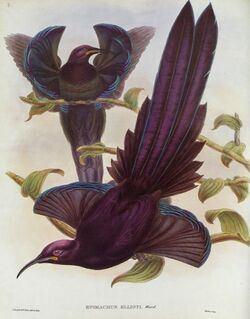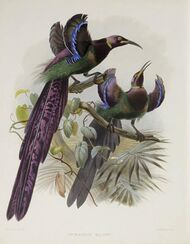Biology:Elliot's bird-of-paradise
| Elliot's bird of paradise | |
|---|---|

| |
| Illustration by John Gould | |
| Scientific classification | |
| Domain: | Eukaryota |
| Kingdom: | Animalia |
| Phylum: | Chordata |
| Class: | Aves |
| Order: | Passeriformes |
| Superfamily: | Corvoidea |
| Family: | Paradisaeidae |
| Hybrid: | Epimachus fastuosus × Astrapia nigra |
| Synonyms | |
| |
Elliot's bird of paradise is a bird in the family Paradisaeidae, first described by Edward Ward in 1873. The bird is presumed by some ornithologists to be an intergeneric hybrid between a black sicklebill and Arfak astrapia. This assumption was made by the German ornithologist Erwin Stresemann who had also dismissed other new species of birds of paradise as hybrids. Other ornithologists dispute this claim. Errol Fuller argues that the Astrapia is a fanciful choice made with little supporting evidence, and that Elliot's Bird of Paradise is much smaller than the two proposed parent species. The specimens show a number of characteristics not present in either parent species, adding weight to the possibility of the specimens constituting a unique species.[1] Stresemann had previously used the A. nigra x E. fastuosus explanation for the astrapian sicklebill as well.
History
Only two adult male specimens are known of this bird, held in the British Natural History Museum and the Dresden Natural History Museum, and presumably deriving from the Vogelkop Peninsula of north-western New Guinea.[2] In 1930, Stresemann inspected both specimens and declared Elliot's Bird of Paradise to be a hybrid rather than a “real” species. Ornithologists have continued to express doubts about the bird's taxonomic status, however. As recently as 2012, Julian Hume and Michael Walters suggested that it is likely the elusive bird is either rare or extinct.[3]
Notes
References
- Frith, Clifford B.; Beehler, Bruce M. (1998). The Birds of Paradise. Oxford: Oxford University Press. ISBN 978-0-19-854853-9.
- Fuller, Errol. (1995). The Lost Birds of Paradise. Shrewsbury: Swan Hill Press. ISBN 978-1-85-310566-1.
- Hume, Julian P.; Walters, Michael. (2012). Extinct Birds. London: T & AD Poyser. ISBN 978-1-40-815725-1.
- De Vos, Rick (2017). "Extinction in a Distant Land: The Question of Elliot's Bird of Paradise". Extinction Studies: Stories of Time, Death and Generations. New York: Columbia University Press. pp. 88–115. ISBN 978-0-23-117881-5.
 |


